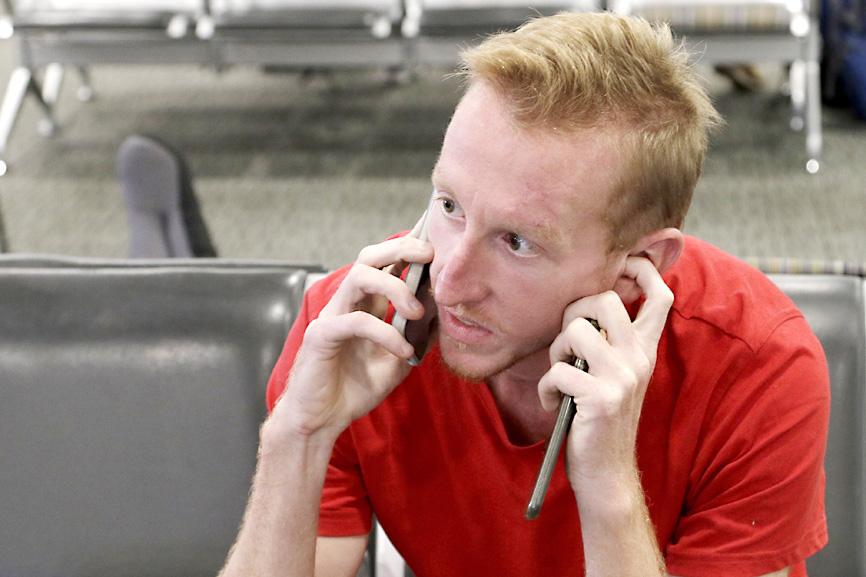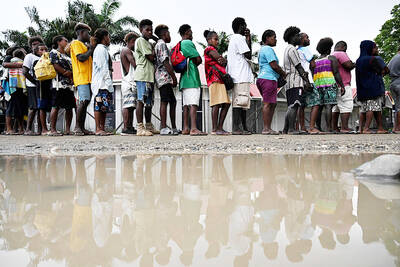New Zealand would stick to its tough curbs to combat COVID-19, despite some early signs the spread of the illness has been stabilizing, New Zealand Prime Minister Jacinda Ardern said yesterday.
The country’s 67 new infections were the lowest in five days, taking its tally to just more than 1,100. New Zealand has reported one death.
“Our actions for the remainder of the period in level four will be about doubling down to ensure the gains made in the first half are not squandered in the second,” Ardern told reporters in Wellington.

Photo: AP
Level-four curbs allow people to take walks or go to supermarkets for essentials, but they are required to stay 2m apart.
“I don’t want New Zealand to be at level four for a minute longer than needed, but equally there is no plan to move from level four early,” Ardern added.
New Zealand started a four-week total lockdown of its population of about 5 million 12 days ago, and declared a national emergency to slow the spread of the virus.
People have been told to stay home with all non-essential services, schools and offices shut for a month, amid warnings that offenders face large fines and even jail.
Nearly half of New Zealand’s cases are related to overseas travel, with cases of community transmission accounting for about 2 percent.
The increase in cases is leveling off and exponential growth has been avoided, New Zealand Director-General of Health Ashley Bloomfield told a separate briefing.
“The only way to ensure the numbers will drop is to keep doing what we are doing,” he said.
Meanwhile, German tourist Steffen Schmieg joked that his last option for getting home from New Zealand was to swim.
Schmieg is among an estimated 100,000 tourists who found themselves stranded in New Zealand after it went into lockdown.
Late last week, officials relaxed the rules enough to allow tourists to begin catching connecting domestic flights and for charter flights to start operating.
About 12,000 Germans have signed up for a repatriation program and yesterday, Schmieg joined dozens of other Germans at the Christchurch Airport to catch a flight back to Frankfurt. The flight was chartered by the German government.
Schmieg, 26, said he traveled to New Zealand a month ago to visit a friend and tour the country.
He managed to see his friend in time, but has been holed up at an Airbnb since the lockdown began.
“I’ve been doing nothing,” he said. “Chilling, relaxing, eating too much.”
He said New Zealand was a safe place to stay and he was never too worried about getting home: “It’s been sweet as,” he said, using a local phrase that means everything is okay.
About as many British tourists as Germans have registered with officials as they also try to get home. Yet unlike Germany, Britain’s government is not planning any charter flights from New Zealand or Australia at this point, and is instead encouraging people to book one of the few commercial flights that are still available.

SEEKING CHANGE: A hospital worker said she did not vote in previous elections, but ‘now I can see that maybe my vote can change the system and the country’ Voting closed yesterday across the Solomon Islands in the south Pacific nation’s first general election since the government switched diplomatic allegiance from Taiwan to Beijing and struck a secret security pact that has raised fears of the Chinese navy gaining a foothold in the region. The Solomon Islands’ closer relationship with China and a troubled domestic economy weighed on voters’ minds as they cast their ballots. As many as 420,000 registered voters had their say across 50 national seats. For the first time, the national vote also coincided with elections for eight of the 10 local governments. Esther Maeluma cast her vote in the
Nearly half of China’s major cities are suffering “moderate to severe” levels of subsidence, putting millions of people at risk of flooding, especially as sea levels rise, according to a study of nationwide satellite data released yesterday. The authors of the paper, published by the journal Science, found that 45 percent of China’s urban land was sinking faster than 3mm per year, with 16 percent at more than 10mm per year, driven not only by declining water tables, but also the sheer weight of the built environment. With China’s urban population already in excess of 900 million people, “even a small portion

UNSETTLING IMAGES: The scene took place in front of TV crews covering the Trump trial, with a CNN anchor calling it an ‘emotional and unbelievably disturbing moment’ A man who doused himself in an accelerant and set himself on fire outside the courthouse where former US president Donald Trump is on trial has died, police said yesterday. The New York City Police Department (NYPD) said the man was declared dead by staff at an area hospital. The man was in Collect Pond Park at about 1:30pm on Friday when he took out pamphlets espousing conspiracy theories, tossed them around, then doused himself in an accelerant and set himself on fire, officials and witnesses said. A large number of police officers were nearby when it happened. Some officers and bystanders rushed

HYPOCRISY? The Chinese Ministry of Foreign Affairs yesterday asked whether Biden was talking about China or the US when he used the word ‘xenophobic’ US President Joe Biden on Wednesday called for a hike in steel tariffs on China, accusing Beijing of cheating as he spoke at a campaign event in Pennsylvania. Biden accused China of xenophobia, too, in a speech to union members in Pittsburgh. “They’re not competing, they’re cheating. They’re cheating and we’ve seen the damage here in America,” Biden said. Chinese steel companies “don’t need to worry about making a profit because the Chinese government is subsidizing them so heavily,” he said. Biden said he had called for the US Trade Representative to triple the tariff rates for Chinese steel and aluminum if Beijing was